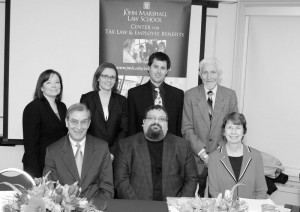
Featured at the Eighth Annual Employee Benefits Symposium were, from left, front row: Professor Lawrence Frolik, Adjunct Professor Barry Kozak, and Professor Kathryn Kennedy; back row: Debra Davis, Professor Amy Monahan, Professor David Hyman, and Alvin Lurie.
On April 29, 2010, the Center for Tax Law and Employee Benefits held its Eighth Annual Employee Benefits Symposium. Each year the symposium offers students,
professors, and practitioners a chance to enjoy the company of fellow academics interested in the employee benefits field, honor scholarship recipients, and most importantly, learn about and discuss current employee benefits issues presented by guest practitioners and professors. Traditionally, symposium papers are published in The John Marshall Law Review; however, this year’s papers will be published in the New York University Review of Employee Benefits and Executive Compensation.
This year’s symposium was moderated by the NYU Review’s editor, Alvin Lurie, an employee benefits practitioner from Boston. Lurie is the exemplar of an employee benefits scholar. He has authored hundreds of employee benefits treatises and articles; served as the first assistant commissioner of the IRS under ERISA, where he headed up the Employee Plans and Exempt Organizations section from 1974–1978; and was the first recipient of the Employee Benefits Lifetime Achievement Award from the Employee Benefits Committee of the American Bar Association Tax Section. It was a privilege for employee benefits students and symposium guests to hear one of the field’s quintessential pioneers speak.
The first presenter of the day was David Hyman, a professor of law and of medicine from the University of Illinois College of Law. He presented on public policy behind tax incentives
for employer-provided health benefits. He laid out the historical importance of tax incentives, and put the recent health care reform debate into perspective.
The next guest was Amy Monahan, a professor at the University of Minnesota Law School, who spoke on whether or not the substance of health insurance should be regulated, and if so, at what level of government. Her presentation spanned both the substantive issues surrounding mandated health insurance, as well as the policy and decision-making process involved in such an endeavor.
The third presenter was Lawrence Frolik, a professor from the University of Pittsburgh School of Law. Frolik discussed several aspects of employment-based, mandatory long- term care insurance, and concluded that the nation must prepare to pay for the inevitable costs associated with long-term care for the elderly now that more individuals are reaching a stage in life requiring long-term care coverage.
The fourth presenter was Debra Davis, a Union Pacific Railroad ERISA tax attorney and adjunct professor at John Marshall who teaches both JD and LLM courses on health and welfare plans and fiduciary responsibility. Her presentation was on the application of the Health Insurance Portability and Accountability Act of 1996 and security protections to employer-sponsored health plans.
Barry Kozak, an adjunct professor at John Marshall and the associate director of the Graduate Employee Benefits Programs, rounded out the presentation portion of the day by graciously stepping in for a presenter who was not able to attend. Kozak presented a work-in-progress on the tax treatment of employer-provided benefits for married, heterosexual employees versus same-sex partners, and how the issue is evolving as many states are beginning to allow same-sex marriages, civil unions, or domestic partnership registries.
The symposium drew to a close with a brief question and answer session, allowing each guest presenter to clarify or expand on points covered in their presentations. Lurie closed the day with speculation about health insurance and employee benefits laws to come, and by congratulating the Center’s director, Kathryn Kennedy, for another successful employee benefits symposium.
